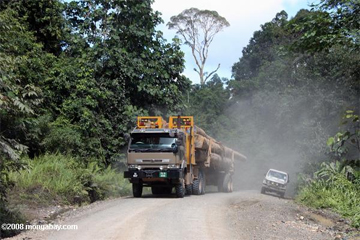Indonesian governors agree to protect Sumatra’s endangered forests
mongabay.com
October 9, 2008
The ten governors of Sumatra — along with four federal ministers — have signed an agreement to protect forests and other ecosystems on the Indonesian island, according to WWF. The announcement is significant because Sumatra is a biodiversity hotspot — home to rare and endemic wildlife — that is under great threat from logging and expansion oil palm plantations. The island has lost 48 percent of its forest cover since 1985.
“This agreement commits all the Governors of Sumatra’s ten provinces, along with the Indonesian Ministries of Forestry, Environment, Interior and Public Works, to restore critical ecosystems in Sumatra and protect areas with high conservation values,” said Hermien Roosita, Deputy Minister of Environment. “The Governors will now work together to develop ecosystem-based spatial plans that will serve as the basis for future development on the island.”
Protecting Sumatra’s environment will help combat climate change. More than 13 percent of the island’s remaining forest cover consists of carbon-rich peat forest, which stores several times the amount of carbon as conventional rainforest.

|
“By protecting these forests from deforestation, Sumatra will provide a significant contribution to mitigate global climate change,” said Marlis Rahman, Vice Governor of West Sumatra Province.
While the announcement is a positive step for protecting threatened habitats in Sumatra, slowing deforestation will be a challenge. Much of Sumatra’s population is reliant on subsistence farming or dependent on jobs in industries that drive large-scale forest destruction, including logging and industrial agriculture. However recent developments in the western province of Aceh may serve as a model for the rest of Sumatra.
Last year Aceh Governor Irwandi Jusuf imposed a province-wide moratorium on logging in hopes that the emerging market for carbon sequestered in forests would offer better long-term prospects for the people of the province. The governor, a former rebel who was one of only 40 survivors after the December 2004 tsunami struck the prison where he was incarcerated, signed an agreement to protect and promote sustainable development in a 750,000-hectare forest reserve that is home to Sumatran elephant, the Clouded Leopard, and the Sumatran Tiger. By preventing logging and conversion of Ulu Masen forest for oil palm plantations, planners expect to reduce carbon dioxide emissions by 100 million tons over 30 years. The proceeds — in the form of carbon credits — will help fund health and education projects in the local community.

|
Deals like the one signed in Aceh are increasingly seen as a way to finance conservation while generating sustainable local livelihoods, but they are dependent on the recognition of forestry as a means for reducing greenhouse gas emissions. Deforestation and land use change account for roughly 20 percent of anthropogenic carbon dioxide emissions but currently have no place in international climate agreements. However this is expected to change after the 2009 round of climate talks in Copenhagen. A number of countries, including the U.S. and a coalition of 40 rainforest nations, have signaled that forest conservation must play a critical part in future climate change mitigation schemes.
Related articles
Indonesia’s Riau bans destruction of rainforests and peatlands for palm oil
(8/15/2008) The Indonesian province of Riau on the island of Sumatra has pledged to stop destruction of its forests and carbon-rich peatlands in an effort to reduce carbon emissions from deforestation by 50 percent by 2009.
Asia Pulp & Paper destroying rare Sumatra forest
(3/27/2008) Companies linked to timber giant Asia Pulp & Paper (APP) are illegally building a road that runs through highly endangered peatland forest on the island of Sumatra, according to an investigative report published by Eyes on the Forest, a coalition of NGOs in Indonesia. The road would allow APP and its affiliates to log forests for timber and drain peat soil for the establishment of oil palm plantations. The action would release large amounts of carbon dioxide into the atmosphere from one of the world’s largest contiguous tropical peat swamp forests.
Merrill Lynch invests $9M in rainforest conservation, expects profit
(3/12/2008) Merrill Lynch’s investment in a rainforest conservation project in the Indonesian province of Aceh is worth $9 million over four years, reports Thomas Wright of The Wall Street Journal.
$100 billion worth of carbon released from deforestation in Riau, Sumatra
(2/27/2008) A WWF study found that deforestation of nearly 10.5 million acres of tropical forests and peat swamp in central Sumatra’s Riau Province over the past 25 years has generated 3.7 gigatons of carbon dioxide. Based on today’s $32 closing price for a ton of carbon dioxide for European Union Allowances, the emissions had a theoretical trading value of $118 billion, assuming they could have been traded at the full E.U. carbon price at the time (voluntary offsets would have been worth about $13 billion).
First rainforest-for-carbon-credits deal becomes a reality
(2/7/2008) Villagers in Aceh, the Indonesian province that suffered through three decades of civil war and lost some 170,000 people to the 2004 Indian Ocean tsunami, could soon see $26 million in carbon credits for protecting rainforests from logging under a deal announced today between conservationists, carbon traders, and the Aceh government.
Carbon for forests will help Aceh recover from war, tsunami
(9/18/2007) Carbon credits through forest conservation will play an important role in Aceh’s recovery from decades of civil war and the devastating 2004 tsunami, which left more than 167,000 people dead and 500,000 homeless in the Indonesia province, said Aceh governor Irwandi Jusuf in meeting in San Francisco.














